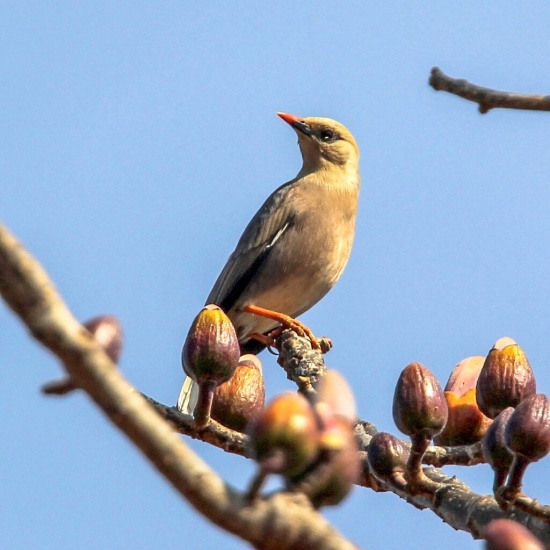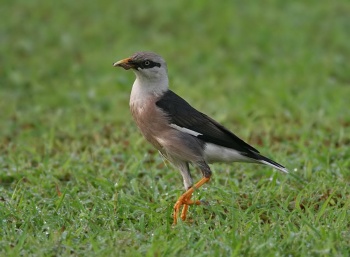m |
(Picture of nominate ssp. Imp size. Dictionary links. Basic tidy-up. References updated) |
||
| Line 1: | Line 1: | ||
| − | [[Image:Vinous- | + | [[Image:Vinous-breasted StarlingMax.jpg|thumb|550px|right|Nominate subspecies<br />Photo © by {{user|max1|max1}}<br>Kalaw, Myanmar, 6 February 2015]] |
'''Alternative names: Vinous-breasted Myna; Jerdon's Starling''' | '''Alternative names: Vinous-breasted Myna; Jerdon's Starling''' | ||
;[[:Category:Acridotheres|Acridotheres]] burmannicus | ;[[:Category:Acridotheres|Acridotheres]] burmannicus | ||
''Sturnus burmannicus'' | ''Sturnus burmannicus'' | ||
==Identification== | ==Identification== | ||
| − | 22cm. A small Starling with pale plumage. | + | 22cm (8¾ in). A small Starling with pale plumage. |
* Dull white forehead and crown | * Dull white forehead and crown | ||
* Greyish-brown upperparts | * Greyish-brown upperparts | ||
| Line 11: | Line 11: | ||
* White chin, throat and upper breast | * White chin, throat and upper breast | ||
* Vinous rest of underparts | * Vinous rest of underparts | ||
| − | * White underwing-coverts | + | * White underwing-[[Topography#General Anatomy|coverts]] |
* Whitish eye with dark bare skin forming black patch | * Whitish eye with dark bare skin forming black patch | ||
| − | * Orange-red bill whit blackish base of lower mandible | + | * Orange-red bill whit blackish base of lower [[Dictionary_M-O#M|mandible]] |
* Orange-yellow legs | * Orange-yellow legs | ||
Sexes similar. Juveniles are duller, have a brown crown and a brown eye. | Sexes similar. Juveniles are duller, have a brown crown and a brown eye. | ||
| + | ====Variations==== | ||
| + | [[Image:Vinous-breasted_Starling.jpg|thumb|350px|right|ssp ''leucocephalus''<br />Photo © by {{user|Peter+Ericsson|Peter Ericsson}}<br>Nakorn Nayok Military Academy, [[Thailand]], June 2009]] | ||
''Leucocephalus'' is generally darker and has a pale neck collar. | ''Leucocephalus'' is generally darker and has a pale neck collar. | ||
==Distribution== | ==Distribution== | ||
| Line 23: | Line 25: | ||
Fairly common in its range. | Fairly common in its range. | ||
==Taxonomy== | ==Taxonomy== | ||
| − | Two subspecies recognized: | + | Often placed in genus [[:Category:Sturnus|Sturnus]].<br /> |
| + | May form a [[Dictionary_P-S#S|superspecies]] with [[Black-winged Starling]]. | ||
| + | ====Subspecies==== | ||
| + | Two subspecies recognized<sup>[[#References|[1]]]</sup>: | ||
* ''A. b. burmannicus'' in [[Burma]] and South [[China]] (extreme southwest Yunnan) | * ''A. b. burmannicus'' in [[Burma]] and South [[China]] (extreme southwest Yunnan) | ||
* ''A. b. leucocephalus'' in [[Thailand]], [[Cambodia]], [[Laos]] and [[Vietnam]] | * ''A. b. leucocephalus'' in [[Thailand]], [[Cambodia]], [[Laos]] and [[Vietnam]] | ||
| − | + | ||
| − | |||
==Habitat== | ==Habitat== | ||
Open grassland, gardens, cultivated areas, scrub, semi-desert and large clearings in forests. Occurs up to 1500m. | Open grassland, gardens, cultivated areas, scrub, semi-desert and large clearings in forests. Occurs up to 1500m. | ||
==Behaviour== | ==Behaviour== | ||
| + | ====Diet==== | ||
Feeds on fruit and insects. | Feeds on fruit and insects. | ||
Forages in pairs or small flocks mainly on the ground. | Forages in pairs or small flocks mainly on the ground. | ||
Forms large and noisy communal roosts in bamboo, reeds or sugar cane. | Forms large and noisy communal roosts in bamboo, reeds or sugar cane. | ||
| + | ====Breeding==== | ||
Breeding season from April to November. The nest is placed in a tree hole, under house eaves or in a thatched roof. | Breeding season from April to November. The nest is placed in a tree hole, under house eaves or in a thatched roof. | ||
| + | ====Movements==== | ||
Local movements recorded. | Local movements recorded. | ||
==References== | ==References== | ||
| − | #{{Ref- | + | #{{Ref-Clements6thAug19}}#{{Ref-HBWVol14}} |
{{ref}} | {{ref}} | ||
==External Links== | ==External Links== | ||
Revision as of 20:32, 8 October 2020
Alternative names: Vinous-breasted Myna; Jerdon's Starling
- Acridotheres burmannicus
Sturnus burmannicus
Identification
22cm (8¾ in). A small Starling with pale plumage.
- Dull white forehead and crown
- Greyish-brown upperparts
- Brown wings with white wing-patch
- Brown tail with white tips
- White chin, throat and upper breast
- Vinous rest of underparts
- White underwing-coverts
- Whitish eye with dark bare skin forming black patch
- Orange-red bill whit blackish base of lower mandible
- Orange-yellow legs
Sexes similar. Juveniles are duller, have a brown crown and a brown eye.
Variations
Leucocephalus is generally darker and has a pale neck collar.
Distribution
Found from Burma southeast to extrem southwest Yunnan (China), Thailand (except northwest and south), Cambodia, Laos and Vietnam (except north).
Records in peninsular Malaysia and Singapore may refer to vagrants or escapees.
Rare exotic in Taiwan but not established there.
Fairly common in its range.
Taxonomy
Often placed in genus Sturnus.
May form a superspecies with Black-winged Starling.
Subspecies
Two subspecies recognized[1]:
- A. b. burmannicus in Burma and South China (extreme southwest Yunnan)
- A. b. leucocephalus in Thailand, Cambodia, Laos and Vietnam
Habitat
Open grassland, gardens, cultivated areas, scrub, semi-desert and large clearings in forests. Occurs up to 1500m.
Behaviour
Diet
Feeds on fruit and insects. Forages in pairs or small flocks mainly on the ground. Forms large and noisy communal roosts in bamboo, reeds or sugar cane.
Breeding
Breeding season from April to November. The nest is placed in a tree hole, under house eaves or in a thatched roof.
Movements
Local movements recorded.
References
- Clements, J. F., T. S. Schulenberg, M. J. Iliff, S. M. Billerman, T. A. Fredericks, B. L. Sullivan, and C. L. Wood. 2019. The eBird/Clements Checklist of Birds of the World: v2019. Downloaded from http://www.birds.cornell.edu/clementschecklist/download/
- Del Hoyo, J, A Elliott, and D Christie, eds. 2009. Handbook of the Birds of the World. Volume 14: Bush-shrikes to Old World Sparrows. Barcelona: Lynx Edicions. ISBN 978-8496553507
Recommended Citation
- BirdForum Opus contributors. (2024) Vinous-breasted Myna. In: BirdForum, the forum for wild birds and birding. Retrieved 6 May 2024 from https://www.birdforum.net/opus/Vinous-breasted_Myna





